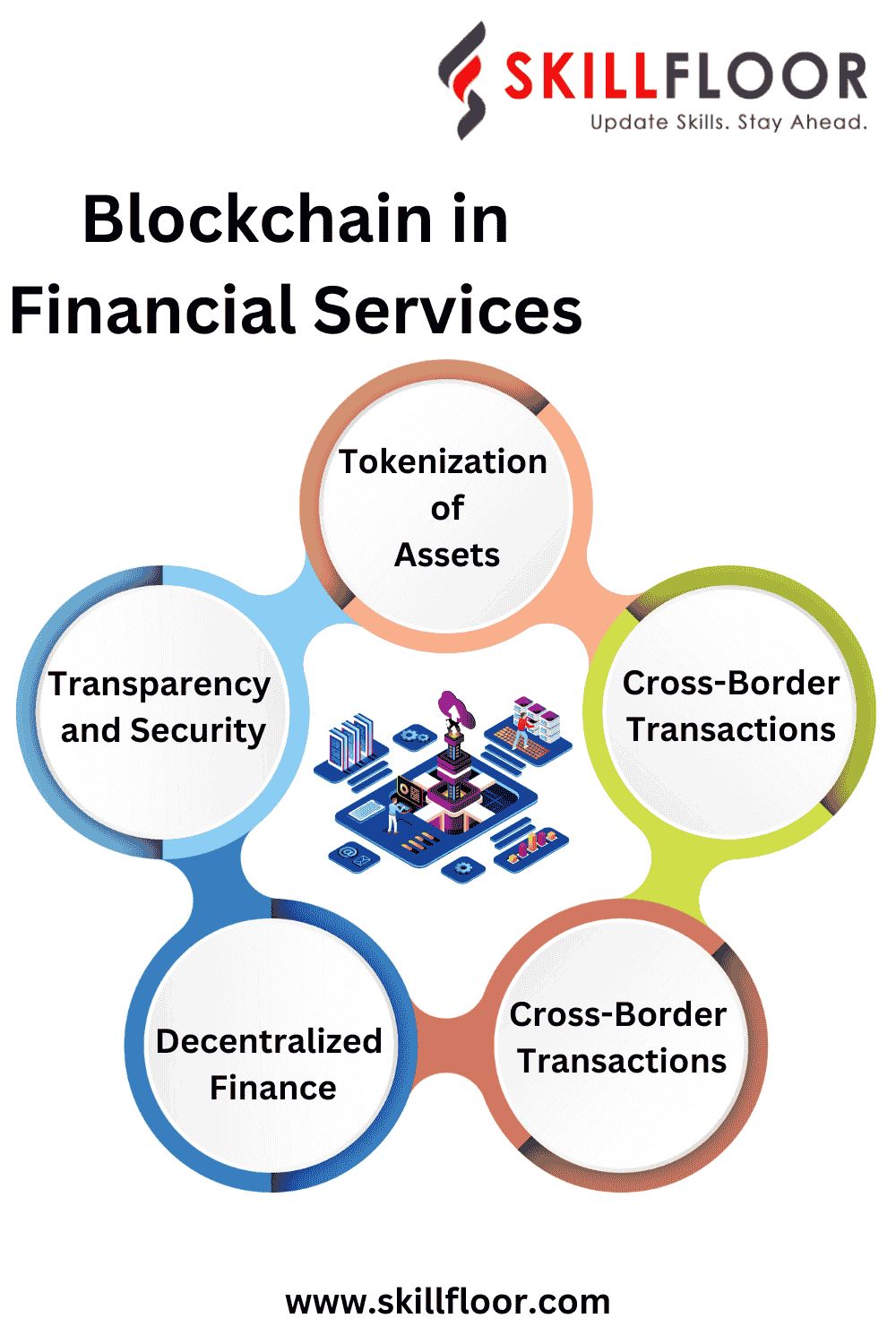Blockchain Applications Beyond Cryptocurrencies
Explore the diverse applications of blockchain technology beyond cryptocurrencies. Discover how blockchain is revolutionizing industries, enhancing security, and enabling transparent and decentralized systems.

Beyond cryptocurrencies, blockchain's impact is transformative. In finance, it revolutionizes banking through decentralized finance (DeFi) and smart contracts. Industries like healthcare benefit from secure, transparent data management, while real estate transactions are streamlined with automated contracts. Blockchain extends its influence to voting systems, intellectual property protection, and cross-border payments, showcasing its versatile applications and reshaping diverse sectors.
What Is Blockchain?
Blockchain is like the digital ledger of the future. It's a secure and decentralized way of recording and verifying transactions across a network of computers. Imagine a chain of blocks where each block contains a list of transactions, and once a block is filled, it's linked to the previous one, creating a chain. This technology ensures transparency, immutability, and trust in a variety of applications beyond just cryptocurrencies. From finance to supply chain management, understanding blockchain is key to grasping the next level of secure and transparent digital interactions.
Blockchain in Supply Chain Management
Supply chain management, a complex network of interconnected processes spanning production to distribution, has long grappled with challenges related to transparency, traceability, and trust. Enter blockchain, a technology originally devised for cryptocurrencies like Bitcoin, but one that has found its stride in revolutionizing supply chain management. Let's delve into how blockchain is reshaping the landscape of supply chains by providing a secure, transparent, and tamper-resistant solution.
1. Transparency through Immutable Ledgers
At the core of blockchain's impact on supply chains lies its ability to establish transparency through immutable ledgers. Each transaction or event in the supply chain is recorded as a block, and these blocks are linked in a chain. Once a block is added, it cannot be altered or deleted. This ensures an unchangeable record of every step in the supply chain, offering stakeholders unprecedented visibility into the movement and status of goods.
2. Enhanced Traceability for Better Accountability
One of the perennial challenges in supply chain management is the ability to trace the origin and journey of products. Traditional systems often involve multiple parties and intermediaries, leading to a lack of real-time visibility. With blockchain, every participant in the supply chain has access to a shared, decentralized ledger, providing a single version of the truth. This not only streamlines traceability but also enhances accountability, as each participant can be held accountable for their part in the process.
3. Smart Contracts Automating Processes
Smart contracts, self-executing contracts with the terms directly written into code, play a pivotal role in streamlining supply chain processes. These contracts automatically execute predefined actions when specific conditions are met. In the context of supply chain management, smart contracts can facilitate and automate various tasks, such as triggering payments upon delivery, updating inventory levels, or enforcing penalties for delays. This not only reduces the need for intermediaries but also minimizes the risk of errors and disputes.
4. Mitigating Fraud and Counterfeiting
Fraud and counterfeiting are perennial concerns in the supply chain industry. Blockchain's decentralized and tamper-resistant nature acts as a robust defense mechanism against these threats. The immutability of the ledger ensures that once a product is recorded, its authenticity and origin can be verified throughout the supply chain. This is particularly crucial in industries like pharmaceuticals, where the integrity of the supply chain directly impacts the safety of end consumers.
5. Real-Time Visibility for Efficient Decision-Making
In a dynamic and globalized supply chain, real-time information is paramount for efficient decision-making. Blockchain, particularly through the use of cryptocurrencies, facilitates faster and more cost-effective cross-border payments. This real-time visibility not only enables quicker responses to disruptions or changes but also facilitates data-driven decision-making, optimizing the overall efficiency of the supply chain.
6. Building Trust in the Supply Chain Ecosystem
Trust is the bedrock of any successful supply chain. Blockchain, by design, fosters trust among participants. The decentralized and consensus-driven nature of the technology ensures that all parties have confidence in the accuracy and integrity of the information recorded on the blockchain. This trust is particularly valuable in scenarios where multiple entities, often with conflicting interests, collaborate within a supply chain.
Blockchain in Cyber Security
Blockchain technology is reshaping the landscape of cybersecurity, offering a revolutionary approach to safeguarding digital assets. Traditionally, cybersecurity relied on centralized systems, susceptible to single points of failure. In contrast, blockchain's decentralized and tamper-resistant ledger enhances data integrity and transparency. Its cryptographic principles ensure secure authentication and authorization processes, mitigating the risk of unauthorized access.
Blockchain's distributed consensus mechanism fortifies resilience against cyber attacks, making it exceedingly challenging for malicious actors to compromise the system. Moreover, the immutability of blockchain records ensures a transparent and traceable audit trail, facilitating the swift identification of security breaches. By fundamentally altering how data is stored, accessed, and verified, blockchain emerges as a formidable ally in the ongoing battle against cyber threats, setting new standards for the future of digital security.
Blockchain in Voting
Blockchain in voting presents a transformative solution to longstanding challenges in electoral processes. The decentralized and tamper-resistant nature of blockchain ensures the integrity and security of voting systems. Each vote is recorded as a block on the blockchain, creating an immutable and transparent ledger. This not only reduces the risk of fraud and manipulation but also enhances overall trust in the electoral process. Blockchain's transparency allows voters to independently verify their own votes, fostering a sense of confidence in the accuracy of results. Additionally, the elimination of intermediaries and centralized authorities minimizes the potential for external interference, making blockchain a robust technology for fortifying the democratic principles of fairness, transparency, and trust in electoral systems worldwide.
Blockchain in Financial Services
Blockchain technology, initially introduced as the underlying infrastructure for cryptocurrencies like Bitcoin, has rapidly evolved into a transformative force in the financial services sector. This evolution extends well beyond the realm of digital currencies, influencing the core operations and structures of traditional banking and financial institutions. Here's a closer look at how blockchain is reshaping financial services:

1. Decentralization and Disintermediation
At the heart of blockchain's impact on financial services is its decentralized nature. Unlike traditional financial systems where a central authority (such as a bank) controls and validates transactions, blockchain operates on a distributed ledger. This decentralization reduces reliance on intermediaries, such as banks and clearinghouses, streamlining processes and potentially reducing costs.
2. Smart Contracts
Smart contracts, self-executing contracts with the terms of the agreement directly written into code, are a key feature of blockchain technology. In financial services, smart contracts automate and enforce contractual agreements, eliminating the need for intermediaries and reducing the risk of fraud. For example, in lending, smart contracts can automatically execute loan agreements and manage repayments based on predefined conditions.
3. Transparency and Security
Blockchain's transparent and tamper-resistant ledger ensures that all participants in a financial transaction have access to the same information in real time. Each transaction is recorded in a block that is linked to the previous one, creating an immutable chain. This transparency enhances the security of financial transactions, as any attempt to alter the data would require consensus from the majority of participants in the network.
4. Decentralized Finance (DeFi)
Decentralized Finance, or DeFi, is a rapidly growing sector within blockchain that aims to recreate and enhance traditional financial services without relying on central authorities. DeFi platforms use smart contracts to enable peer-to-peer lending, borrowing, and trading of financial instruments, providing users with more control over their assets and reducing the need for traditional financial intermediaries.
5. Cross-Border Transactions
Traditional cross-border transactions are often plagued by delays, high fees, and complexity due to multiple intermediaries and different regulatory frameworks. Blockchain, particularly through the use of cryptocurrencies, facilitates faster and more cost-effective cross-border transactions. This has the potential to revolutionize the way money is transferred globally, providing a more efficient alternative to traditional banking systems.
6. Tokenization of Assets
Blockchain enables the tokenization of various assets, including real estate, stocks, and commodities. This process involves representing ownership or a share of an asset through a digital token on a blockchain. Tokenization can make traditionally illiquid assets more accessible to a broader range of investors, facilitating fractional ownership and increasing liquidity in financial markets.
7. Enhanced Security and Fraud Prevention
The cryptographic nature of blockchain ensures the security and integrity of financial transactions. With each transaction being recorded in a block that is linked to the previous one, the decentralized and tamper-resistant nature of the technology makes it exceedingly difficult for malicious actors to alter transaction history or engage in fraudulent activities.
Blockchain technology has transcended its origins in cryptocurrencies, impacting industries ranging from supply chain management to cybersecurity, voting systems, and financial services. Its decentralized, transparent, and tamper-resistant nature addresses long-standing challenges, fostering trust, efficiency, and security. As blockchain continues to evolve, its transformative potential is poised to redefine how we interact with digital systems, setting new standards for transparency and integrity in the digital age.






























































